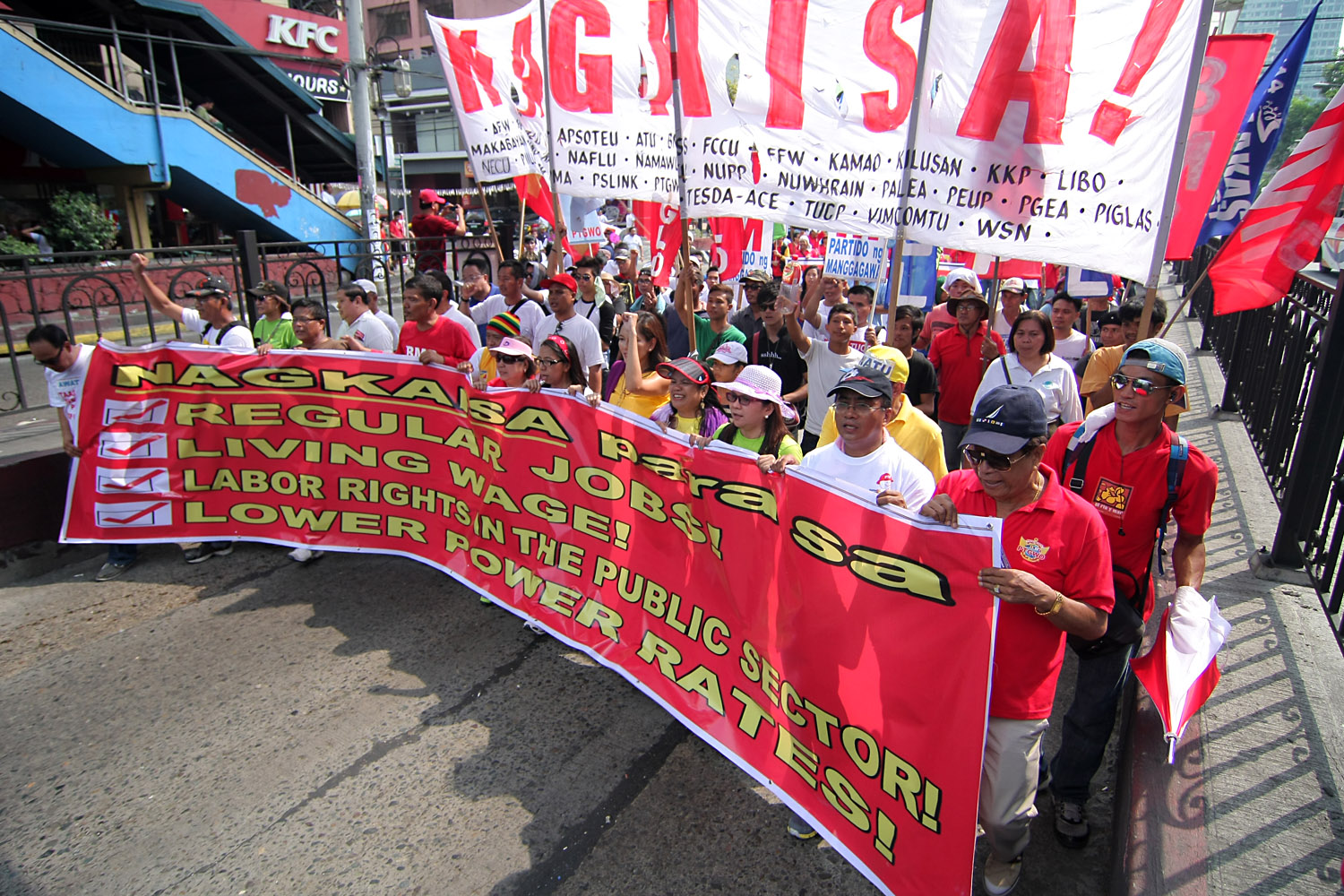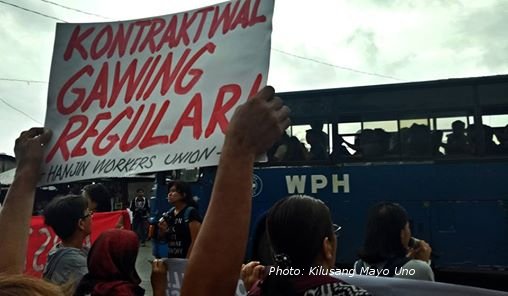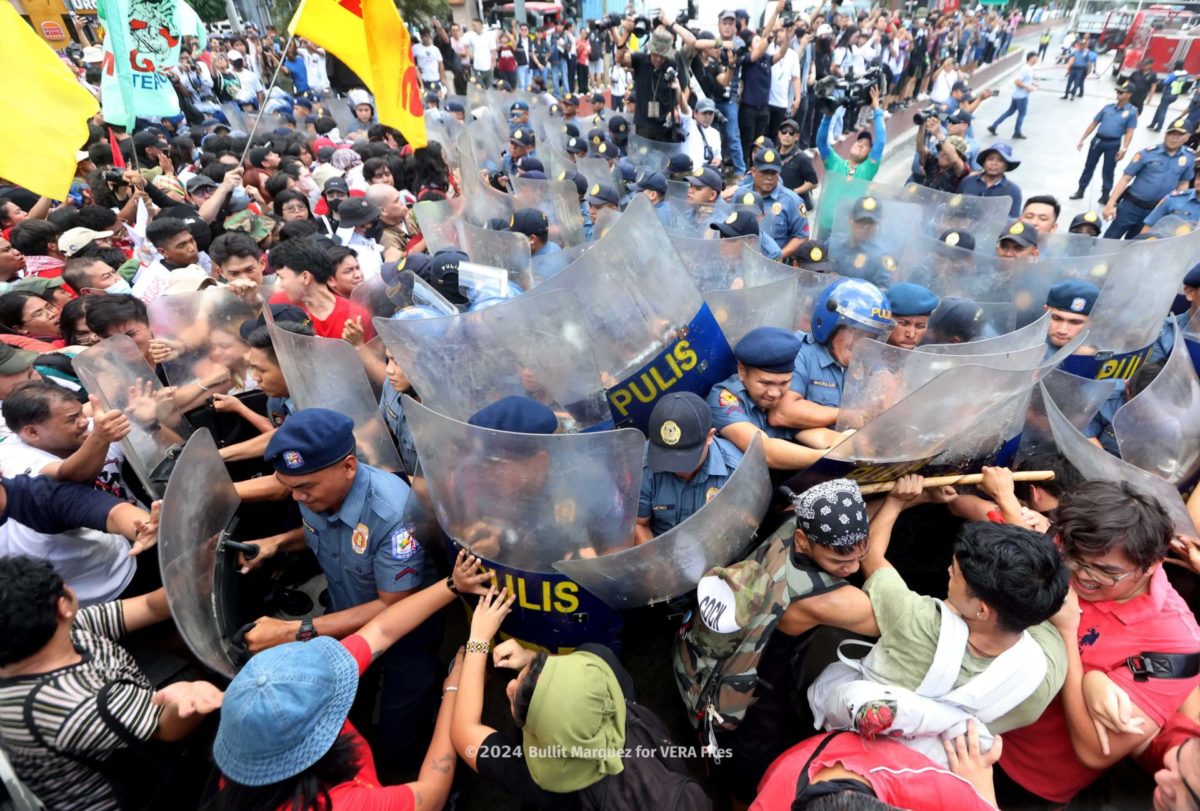By EIMOR SANTOS and LLOYD REYES
Photos by VINCENT GO
JENNY Tanael, 47, is a wife of a minimum wage earner and mother of a contractual worker.
Her eldest son Juan Paolo keeps on hunting for a job each time his five-month contract in a fastfood chain expires. Sometimes it takes him six months to find work at another branch of said restaurant. In between jobs, he relies for support on his father who earns less than P 400 per day as a security guard.
Her son has been unemployed for two months now. Since Juan Paolo is turning 24 he will have to look for another company since his former employer only accepts workers 23 years and below.
Tanael hopes that at the very least, workers’ rallies like the May 1 Labor Day rally she attended can put an end to contractualization that has been plaguing workers (like his son) and their families.
An across-the-board wage increase and an end to contractualization were among the major demands of workers aired at the Labor Day rallies all over the country. The Kilusang Mayo Uno, or KMU, is demanding a daily wage increase of P125 in Metro Manila.
One of the participating groups, the Confederation of Independent Unions in the Public Sector (CIU), said its members went to the streets primarily to halt the widespread contractualization in the country.
“Humina ang seguridad ng trabaho (Job security was weakened),” Elpidio Maramot, CIU deputy secretary general for external affairs, said.
Maramot said that some employees have worked for more than 10 years as contractuals. The reason given to them by their employers for not being regularized was that their jobs were “not essential.”
“10 years, hindi essential (jobs)?” he asked in disbelief.
Bayan Muna and Makabayan coalition president Satur Ocampo shared the same sentiment, saying contractualization is a widespread issue that has been skirted by all administrations since the time of former President Fidel Ramos’.
Some workers from other countries like Margaret Donehue expressed sympathy for the Filipino workers. Donehue is an office worker in Australia and a delegate at the 28th International Solidarity Affair (ISA), an annual gathering of workers, trade-union activists, labor rights advocates, from all global regions, hosted by the KMU.
Donehue said she supports the Filipino workers’ struggle to increase wages and junk contractualization, saying the government has designed such schemes to deprive the workers of their rights.
On the wage hike issue, KMU chairperson Elmer Labog said that an P8 increase will not suffice.
“Lamunin nila ‘yung ocho-pesos nila kasi kapag sumakay ka ng jeep, baka ibato sa’yo ng jeepney driver ‘yan dahil one-way kulang pa’yon (They can have that P8-increase because if you ride a jeepney, the driver might throw it back to you because it is not even enough for a one-way fare),” he said.
Labog said that the politically unconscious workers tend to think that they are lucky to even have jobs even if they are being taken advantage of.
He said: “Mabuti na lamang at may trabaho kahit paano, kahit na pinagsasamantalahan na s’ya, tinitiis na lamang. Hanggang sa dumating ang isang araw na kailangan silang mulatin at organisahin, dun nila nakikita ang kanilang lakas (They think it’s good that they have jobs. Even if they are being abused they just suffer until the day that they become aware of this and become organized, then they will see their strength).”
He also said that this shows that the capitalists the administration has been supporting treat the workers not as people but as machines.
Ace Ligsay, chairperson of the University of the Philippines-Diliman’s (UPD) Alyansa student political party, said at the Labor Day rally that the problems workers face are also their own.
The party advocates the passage of the Security of Tenure Bill to ensure security of workers in their jobs and that they get the benefits due them as well. Ligsay said that upon students’ entry to the real world, they face problems like underemployment, unjust wages and contractualization.
Ligsay also said that the workers’ taxes subsidize their schooling as scholars of the state thus it is only fitting that they give back what was given to them.
(The authors are journalism students of the University of the Philippines who are writing for VERA Files as part of their internship.)
![]()




